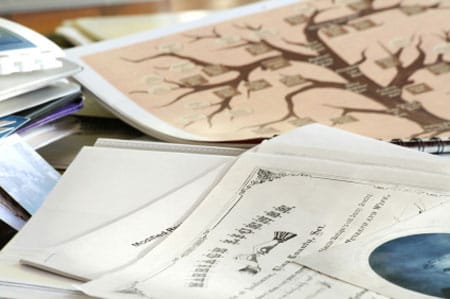Why you won't you find your ancestors living in one place for all time.
I talked to an amateur family historian a couple of months ago who was dismayed that he could trace his family back only about 125 years, and perhaps more dismayed when I said that sometimes happens. I can trace one or two of my lines back to the Middle Ages, but most lines peter out anywhere from 200 to 400 years ago, simply because there weren't many records for ordinary folks-and because people are inherently migrants.
Think how simple it might be to trace your family tree if people didn't move from place to place. You could visit the local cemetery and see the headstone of your 20th great grandparents, climate conditions permitting.

The town clerk would have records reaching back as far as literacy existed. North Americans wouldn't be dropping hundreds of dollars in what are sometimes futile searches to find out what village their ancestors came from in Ireland, Ghana or China.
But the reality is that human populations have hit the road for as long as history and archeology can track them. As geneticists push the frontiers of their science, we may learn even more about the paths we have travelled on the face of this planet. There's evidence that human beings have spread from central locations outwards to occupy ever more distant parts of the globe.
Recorded history is a few millennia old. Historians have been able to piece together much of our past from documentation, artifacts and archeological sites. Genealogists working back from the present-the only rational way of proceeding-discover, to their disappointment, that most of the ancestors of most of the human race disappear from written records within a few centuries.
Even the Queen can't tell you who all of her ancestors were beyond a certain date. She has an enviable pedigree through royalty, nobility and gentry, but you find among them kings of England, such as Edmund II whose wife, Edith, "was of unknown origins." And more recently than that, some of the Queen Mother's ancestry fades into obscurity.
For historians, including genealogists, one of the most significant questions to be answered when studying evidence is the reason a document (for example) was created. A grocery list is intended to be a memory aid to a shopper, but a century or two from now someone might see its value as a means of learning what people ate in 21st century Canada; dated grocery store flyers will also satisfy any historical researcher.
When you look at documentation from the past, it quickly becomes clear that certain people got entered in records more than others. Men figure more often than women because they were the titular heads of households, and the government wanted to know how many men were of militia age.
Many an early census counted numbers but not everyone's names. Whether a child was John Smith or Billy Brown was not relevant; what was relevant was how many children under the age of six lived in each district.
Baptism and marriage records from before the 1500s in western society virtually do not exist. The documents we have to work with are annals, chronicles, legal and tax records in connection with property ownership and inheritance.
Unless your people were lords of the manor, which amounts to one family in a community of 50 or 100 families, your genealogical goose is cooked somewhere in the centuries before 1700, or even more recently than that.
So often we set off on our ancestral trail in the belief that, once we trace our forebears back to the old country, we will find them living for all time in one place. Wars, famines, politics, religion, the whims of rulers, natural disasters and personal dreams and desires-not to mention work-all played their part in human migration from place to place.
We are travellers and sojourners. How many of us live where we were born? How many of our grown children still live in our community? There is your answer.
Dr. Terrence M. Punch is the author of the third volume of Erin's Sons: Irish Arrivals in Atlantic Canada 1761-1858 (Baltimore: Genealogical Publishing Company).
